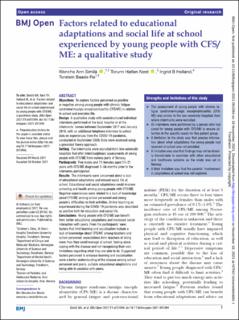Factors related to educational adaptations and social life at school experienced by young people with CFS/ME: A qualitative study
Peer reviewed, Journal article
Published version

Åpne
Permanent lenke
https://hdl.handle.net/11250/2836300Utgivelsesdato
2021Metadata
Vis full innførselSamlinger
Originalversjon
10.1136/bmjopen-2021-051094Sammendrag
Objectives To explore factors perceived as positive or negative among young people with chronic fatigue syndrome/myalgic encephalomyelitis (CFS/ME) in relation to school and everyday life.
Design A qualitative study with semistructured individual interviews performed at the local hospital or at the informants’ homes between September 2017 and January 2018, with an additional telephone interview to collect data on experiences from the COVID-19 pandemic, conducted in September 2020. Data were analysed using a grounded theory approach.
Setting The informants were recruited from two university hospitals that offer interdisciplinary assessments of young people with CFS/ME from various parts of Norway.
Participants Five males and 13 females aged 13–21 years with CFS/ME diagnosed 3–56 months prior to the interviews participated.
Results The informants were concerned about a lack of educational adaptations and missed social life at school. Educational and social adaptations could improve schooling and health among young people with CFS/ME. Negative experiences were related to a lack of knowledge about CFS/ME among school personnel and young people’s difficulties to limit activities. Online teaching as experienced during the COVID-19 pandemic was described as positive both for education and social life.
Conclusions Young people with CFS/ME can benefit from better educational adaptations and increased social interaction with peers. From the participants’ view, factors that limit learning and socialisation include a lack of knowledge about CFS/ME among teachers and school personnel, expectations from teachers of doing more than they could manage at school, feeling alone coping with the disease and not recognising their own limitations regarding what they are able to do. Suggested factors perceived to enhance learning and socialisation were a better understanding of the disease among school personnel and peers, suitable educational adaptations and being able to socialise with peers.
